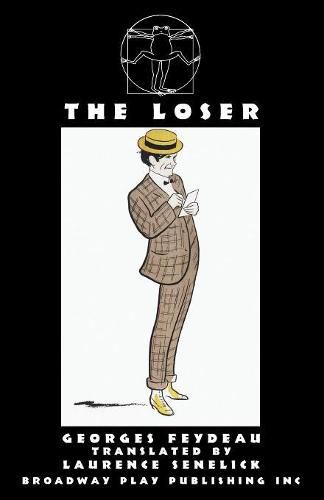Readings Newsletter
Become a Readings Member to make your shopping experience even easier.
Sign in or sign up for free!
You’re not far away from qualifying for FREE standard shipping within Australia
You’ve qualified for FREE standard shipping within Australia
The cart is loading…






This title is printed to order. This book may have been self-published. If so, we cannot guarantee the quality of the content. In the main most books will have gone through the editing process however some may not. We therefore suggest that you be aware of this before ordering this book. If in doubt check either the author or publisher’s details as we are unable to accept any returns unless they are faulty. Please contact us if you have any questions.
In Feydeau’s work, all misunderstandings and slamming doors, THE LOSER is a moment of pure hysteria, a kind of quintessence of the author’s work. In a sort of comic pendant to Zola’s Nana,
Feydeau puts on stage characters guided only by the power of their desires, the will to possess someone else, the exclusive passion for pleasure. In such a society however the places are limited, the combinations difficult. On stage this provides a game of musical chairs that is perfectly hilarious. Those who are not at first motivated by the follies of love end up joining the dance. It all provides a cavalcade which explodes into craziness and hilarious situations. However, there is also in THE LOSER a panic force, an urge to go to extremes which encourages certain dark views of the tragic dimension of the human condition.
Dans la bibliotheque de Cleanthe
George Feydeau created THE LOSER in 1896 with codes appropriate to a now remote era. Arranged marriages often brought men and women together while leaving each the opportunity to let his or her heart take an interest somewhere else. Being caught in the act in the presence of the police was the rule when one or another of the parties wished to put an end to a less truly satisfying union. In THE LOSER the dialogue is studded with double meanings and cleverly placed stings. This awareness of conventions works marvelously when it is recreated in the 2lst century.
Stanislas Claude, Publik Art
$9.00 standard shipping within Australia
FREE standard shipping within Australia for orders over $100.00
Express & International shipping calculated at checkout
Stock availability can be subject to change without notice. We recommend calling the shop or contacting our online team to check availability of low stock items. Please see our Shopping Online page for more details.
This title is printed to order. This book may have been self-published. If so, we cannot guarantee the quality of the content. In the main most books will have gone through the editing process however some may not. We therefore suggest that you be aware of this before ordering this book. If in doubt check either the author or publisher’s details as we are unable to accept any returns unless they are faulty. Please contact us if you have any questions.
In Feydeau’s work, all misunderstandings and slamming doors, THE LOSER is a moment of pure hysteria, a kind of quintessence of the author’s work. In a sort of comic pendant to Zola’s Nana,
Feydeau puts on stage characters guided only by the power of their desires, the will to possess someone else, the exclusive passion for pleasure. In such a society however the places are limited, the combinations difficult. On stage this provides a game of musical chairs that is perfectly hilarious. Those who are not at first motivated by the follies of love end up joining the dance. It all provides a cavalcade which explodes into craziness and hilarious situations. However, there is also in THE LOSER a panic force, an urge to go to extremes which encourages certain dark views of the tragic dimension of the human condition.
Dans la bibliotheque de Cleanthe
George Feydeau created THE LOSER in 1896 with codes appropriate to a now remote era. Arranged marriages often brought men and women together while leaving each the opportunity to let his or her heart take an interest somewhere else. Being caught in the act in the presence of the police was the rule when one or another of the parties wished to put an end to a less truly satisfying union. In THE LOSER the dialogue is studded with double meanings and cleverly placed stings. This awareness of conventions works marvelously when it is recreated in the 2lst century.
Stanislas Claude, Publik Art